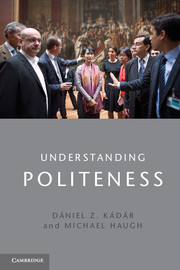Book contents
- Frontmatter
- Contents
- List of figures
- List of tables
- Foreword
- Acknowledgements
- 1 Introduction
- Part I Theoretical framework
- Part II Politeness and time
- 6 Politeness in interaction
- 7 Politeness, convention and rituality
- 8 Politeness and history
- Part III Politeness and social space: from mind to society
- Notes
- Glossary
- References
- Index
7 - Politeness, convention and rituality
Published online by Cambridge University Press: 05 June 2014
- Frontmatter
- Contents
- List of figures
- List of tables
- Foreword
- Acknowledgements
- 1 Introduction
- Part I Theoretical framework
- Part II Politeness and time
- 6 Politeness in interaction
- 7 Politeness, convention and rituality
- 8 Politeness and history
- Part III Politeness and social space: from mind to society
- Notes
- Glossary
- References
- Index
Summary
Introduction
The present book has so far analysed politeness as it emerges and develops in a given interaction. Indeed, in many cases understandings of politeness come into existence ‘on the spot’, as the interactants draw from certain sets of expectancies in co-constructing interaction in localised, situated contexts. If we put politeness on a time scale, it can be argued that evaluative moments of politeness in the here-and-now represent a cycle of participant actions and reactions, which come into existence in either the punctuated or emergent sense of the present moment. However, understandings of politeness are not always completely localised in this way. A certain interaction is often the continuation of a previous one, and so the interactants construct politeness in the light of understandings formed in prior interactions. Even more importantly, many contexts do not necessitate such localised understandings. In many settings, perhaps most typically formal or institutionalised ones, understandings of politeness are arguably less localised in the here-and-now given the interactants are expected to follow certain ‘scripted’ expectations. In such contexts politeness tends to follow certain underlying schemata: pre-existing patterns of thought or behaviour used in recurrent ways that are readily recognisable to members. These schemata reduce uncertainty in the formation and interpretation of linguistic politeness for the simple reason that by relying on them the interactants can follow pre-existing ways of understanding politeness. It can be argued that, if localised understandings of politeness arise in the here-and-now of time, such schemata represent a pre-existing frame for understanding politeness in the here-and-now.
- Type
- Chapter
- Information
- Understanding Politeness , pp. 137 - 155Publisher: Cambridge University PressPrint publication year: 2013



